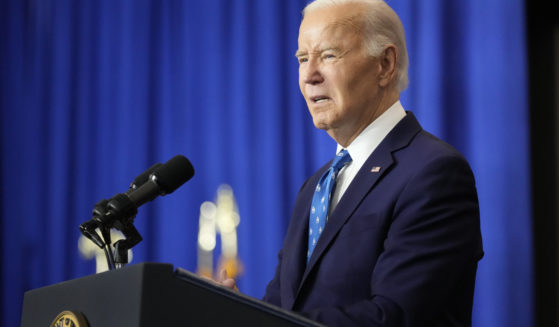As West Furiously Fights Against COVID, Chinese Wet Market Culture Begins To Flourish Again
As countries across the globe struggle with the spread of sickness and death brought on by the Chinese coronavirus, China is getting back to business as usual — in some of its worst ways, anyway.
The (U.K.) Guardian reported Tuesday that officials in China, where COVID-19 first began its rapid spread, declared victory over the virus this past week, though large parts of the country’s government, economy and school system are far from fully recovered, or even functioning.
The continuing uncertainty hasn’t slowed the government’s propaganda effort.
The Guardian quoted a story on an official website describing a Chinese biotech executive in the country’s Hunan Province declaring:
“The war against this epidemic has reached a new stage. We must return to normal … Take off your masks and let your dreams soar!”
That doesn’t tell the whole story, according to The Guardian.
“But the road to recovery has not been without bumps,” the newspaper reported. “‘Fugong fuchan’ (‘resuming work, resuming production’), the government mantra of the past few weeks, has proceeded in fits and starts. Officials have struggled to restart the economy after an unprecedented nationwide shutdown, while also trying to prevent another outbreak.”
In the city of Wuhan, where the first cases of the virus were reported, the Guardian noted that shopping malls are open after extended closures and residents are back out on the streets seeking a return to normal life.
One segment of the communist country that’s reopened is its abominable wet markets, where exotic and domestic animals alike are housed and slaughtered in unsanitary conditions.
Scorpions, spiders, frogs, dogs, cats — and bats — are all on the menu in meat markets across China, The (U.K.) Daily Mail reported.
Squalid meat markets have reopened in China as Beijing celebrates ‘victory’ over the coronavirus https://t.co/prprHUfjzD
— Daily Mail Online (@MailOnline) March 29, 2020
“Everyone here believes the outbreak is over and there’s nothing to worry about any more. It’s just a foreign problem now as far as they are concerned,” a Daily Mail correspondent based in China told the newspaper.
“The markets have gone back to operating in exactly the same way as they did before coronavirus,” the correspondent added. “The only difference is that security guards try to stop anyone taking pictures which would never have happened before.”
All evidence points to China’s wet markets as the genesis for the COVID-19 pandemic that has now killed more than 40,000, according to Johns Hopkins University.
A connection between deadly diseases and bat consumption by humans is undeniable.
According to NPR, researchers have found that bats across China carry roughly 400 strains of coronaviruses. Just like the SARS pandemic of 2003, COVID-19 is believed to have started with a human either consuming or coming into contact with a bat.
“That means 400 potential candidates to spark another outbreak. After all, a coronavirus caused a massive outbreak in China back in 2002,” NPR reported.
Despite the obvious risks associated with open wet markets, China’s answer to the problem seems par for the course. The government is attempting to ban images of the markets from leaking out of the country.
It is the same posture the country took with the coronavirus itself. Rather than be transparent and share information, China’s communist party lied and censored information about COVID-19.
The country went as far as to prevent its own doctors from sharing information about the virus and expelled American reporters from the country.
As a result, many people have died, and many more will likely suffer the same fate in the coming weeks and months.
China’s allowing these markets to remain open is akin to a bad neighbor lighting a match that ends up burning down every house on the block, only to sit down and continue to play with matches once he extinguishes the fire in his own yard.
The regime’s refusal to ban wet markets creates a risk for nations doing business with China, as another disease is all but certain to eventually incubate and spread somewhere down the line.
While wet markets are part of the culture across Southeast Asia, the risk they pose to the global population should be taken into account when countries reevaluate their dealings with China in a post-COVID-19 world.
U.K. Prime Minister Boris Johnson, who himself has tested positive for the coronavirus, is among top British officials said to be furious with China’s authoritarian regime over Beijing’s handling of the disease.
An unnamed British official was quoted by The Daily Mail on Sunday saying that China would face a “reckoning” after the spread of COVID-19 is contained, not only for its disinformation about the virus, but also for its lack of transparency on reported cases and its treatment.
“We have always known their wildlife markets are a recipe for a pandemic,” one source told The Daily Mail. “China needs to close these down immediately. If they don’t, they will rightly become a pariah state.”
Sen. Lindsey Graham said Tuesday on Fox News that he intends to write a letter demanding China close its “gross” and “disgusting” wet markets.
“I’m going to write a letter to the World Health Organization and to the Chinese ambassador asking them to close the Chinese wet markets,” Graham said.
“These are open-air markets, where they sell monkey. They sell bat. We think we — this whole thing started from transmission from a bat to a human. About the last three or four pandemics have come from the Chinese wet markets.”
Graham added, “if you don’t shut those wet markets down, our trading relationship is going to change.”
Other international leaders must follow suit by demanding China permanently close its wet markets.
Truth and Accuracy
We are committed to truth and accuracy in all of our journalism. Read our editorial standards.
Advertise with The Western Journal and reach millions of highly engaged readers, while supporting our work. Advertise Today.












